[ad_1]
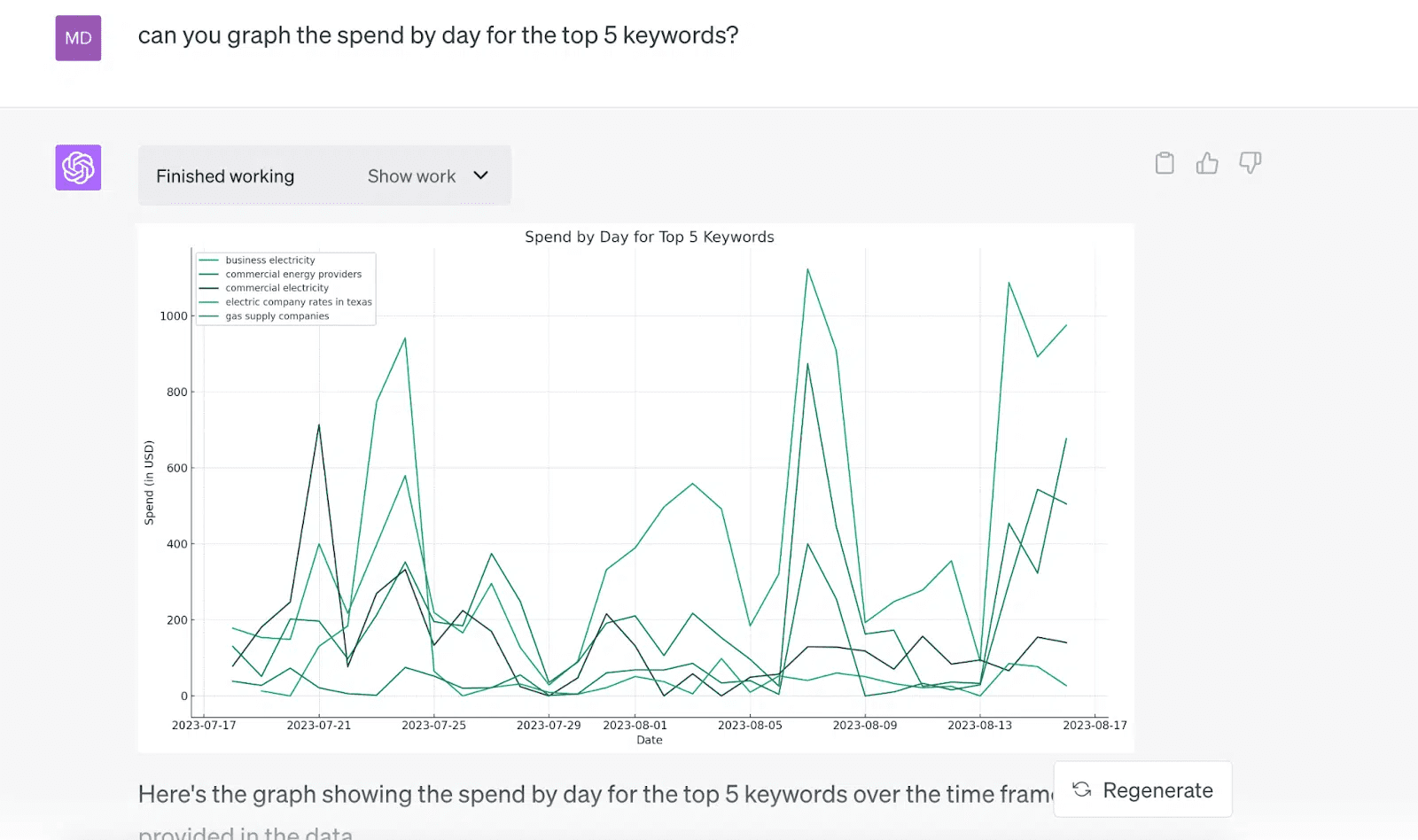
What sort of Information Evaluation can AI do?
We already know ChatGPT as essentially the most versatile AI device, with plugins that allow it to do absolutely anything. It may generate functioning code in Python, R, and plenty of different languages, in addition to complicated SQL queries. As you possibly can think about, combining these functionalities would help you use AI for nearly each a part of your Information Evaluation work.
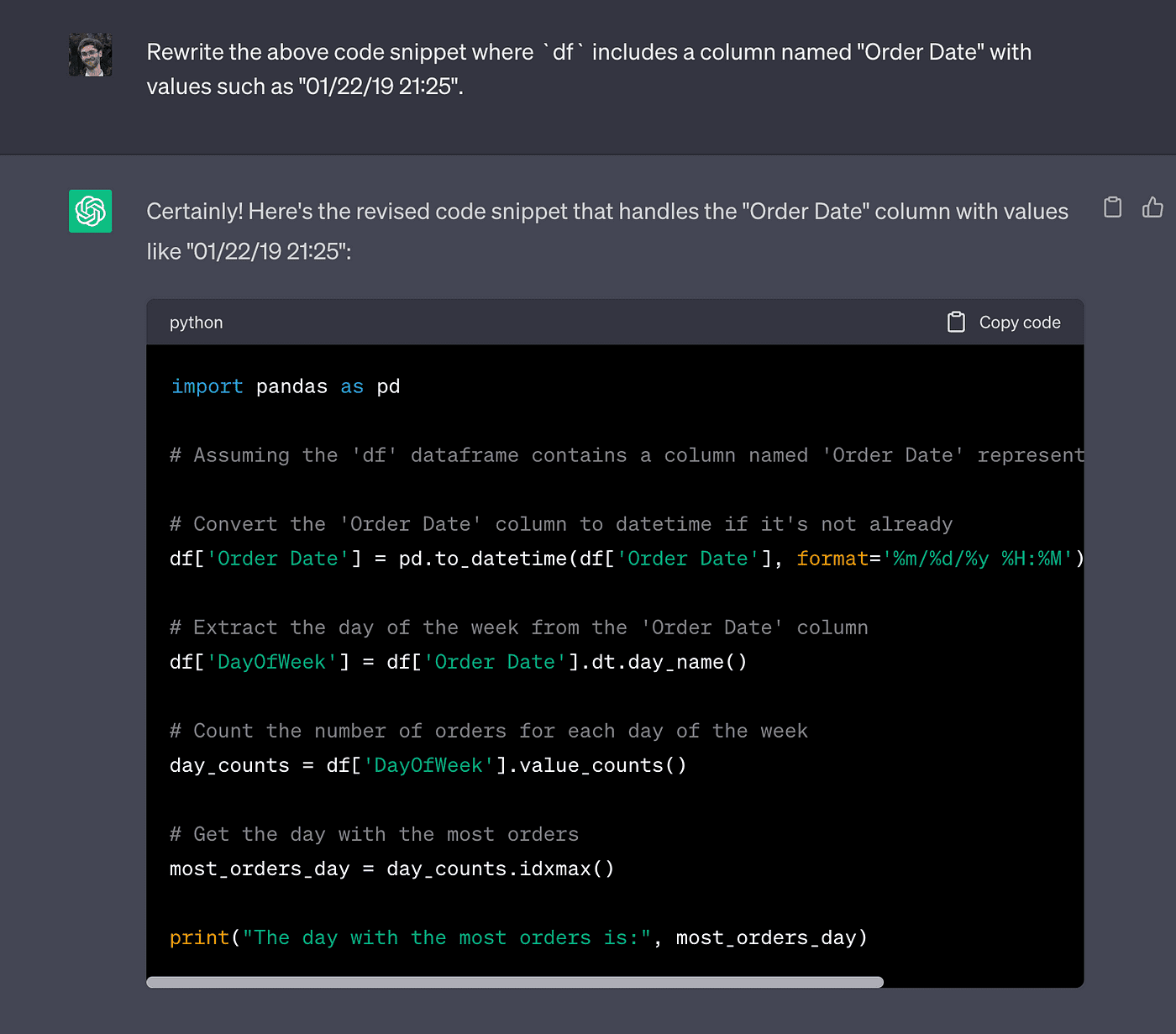
The use instances embrace:
- Querying
- Cleansing and different processing
- Visualizing
With regards to working with knowledge, specialised instruments like Julius AI (for csv information) or BlazeSQL (for SQL Databases) are designed particularly for this goal. In contrast to ChatGPT, these instruments don’t require you to add/join and clarify your knowledge each time you open them up.
ChatGPT works for some fast evaluation on a csv file, however most firms retailer knowledge in SQL databases inside personal networks. Nonetheless specialised instruments can join to those secured SQL databases, and reply your questions by querying your database and visualizing the outcomes.
How may AI change knowledge analysts?
Information Evaluation is all about getting insights from knowledge, knowledge analysts and knowledge scientists are those with the technical expertise to supply stakeholders with the insights they want. However issues have modified, and now AI instruments can efficiently full a few of the duties that would beforehand solely be accomplished by knowledge analysts and knowledge scientists.
In principle a enterprise stakeholder with no technical expertise may now join their knowledge to an AI device, and make a request similar to “Get the month-to-month income grouped by product, for the highest 3 merchandise of the 12 months”. The AI can then seize the information, and even visualize it. The person would solely have to spend a couple of seconds writing out the request. If they’d requested a human colleague, they won’t have gotten a solution for a couple of days, or longer.
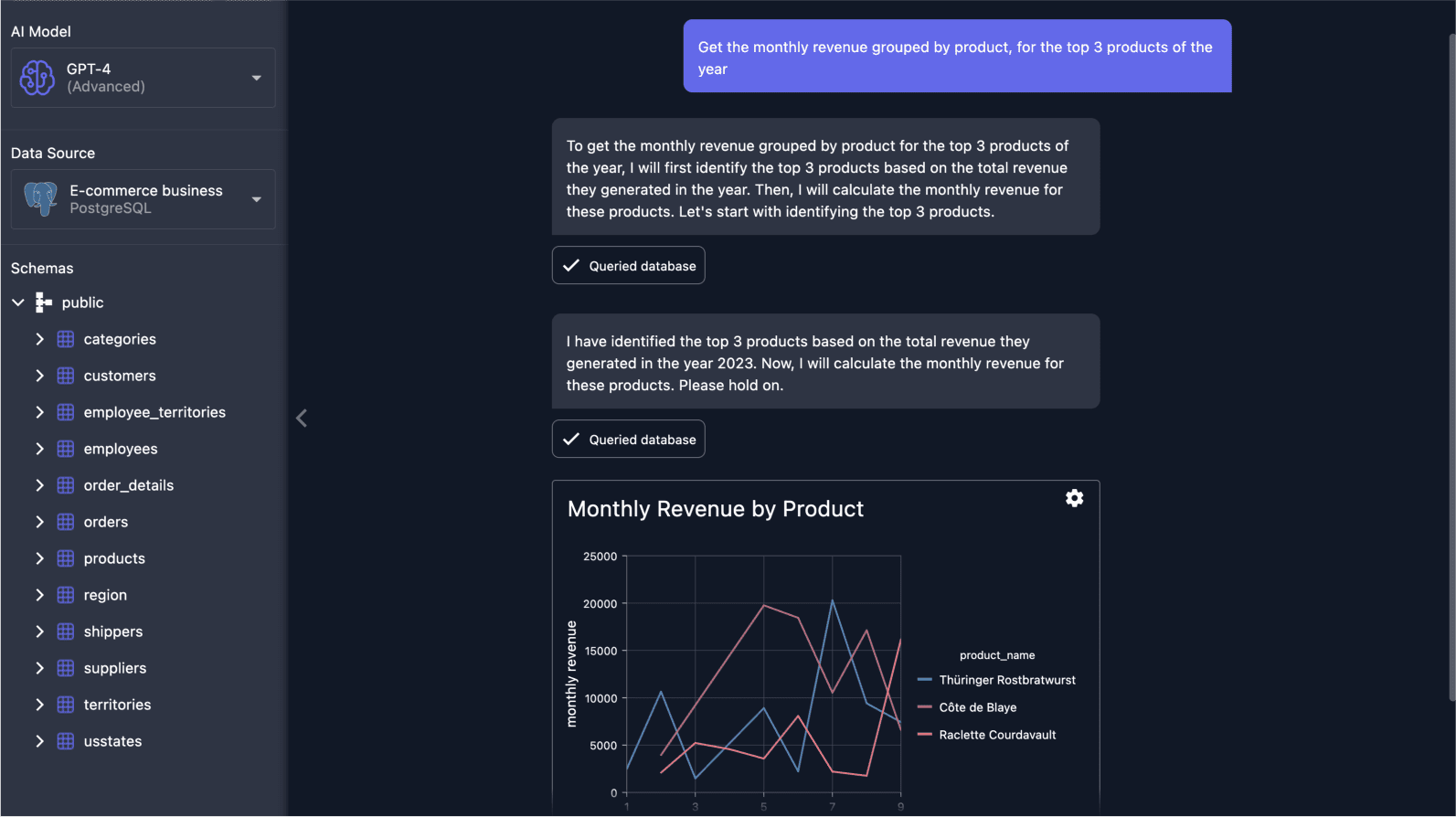
Seeing a picture like this may be each wonderful and worrying for knowledge analysts, however changing knowledge analysts and knowledge scientists isn’t that easy. Merely working an SQL Question and graphing the result’s solely part of their job, and even that may’t all the time be accomplished reliably by AI. It might have labored within the screenshot above, however what if the result’s unsuitable regardless that it seems okay?
Sounds prefer it’s time to speak about some limitations of AI for working with Information.
Limitation #1: AI Hallucinations
Most individuals who’ve labored with ChatGPT and related instruments have heard the time period “hallucination” on this context. Once you ask them about one thing they don’t learn about, they may generally simply make stuff up.
The rationale for these hallucinations is easy: LLMs are like very superior autocomplete algorithms. They return the almost certainly subsequent message in a dialog, primarily based on the information they have been educated on. Due to prime quality datasets and superior coaching methods, this “autocomplete” works so effectively that these instruments can fulfill complicated requests with remarkably prime quality outcomes. Sadly, after they encounter conditions their coaching knowledge didn’t put together them for, the almost certainly subsequent message may not truly make a lot sense.
What if it generates some code that runs, however the code returns the unsuitable knowledge? The enterprise stakeholder utilizing the AI Information Analyst may do not know that the result’s unsuitable, however they’ll’t see the error since they don’t perceive the code.
Limitation #2: Enterprise data.
Often when a brand new knowledge analyst begins working at an organization, they’ll must study what a few of the columns and values imply. It is because the information mannequin was designed by the enterprise. You may’t simply analyze knowledge with out understanding the place it comes from, as a result of widespread information isn’t sufficient to know most databases.
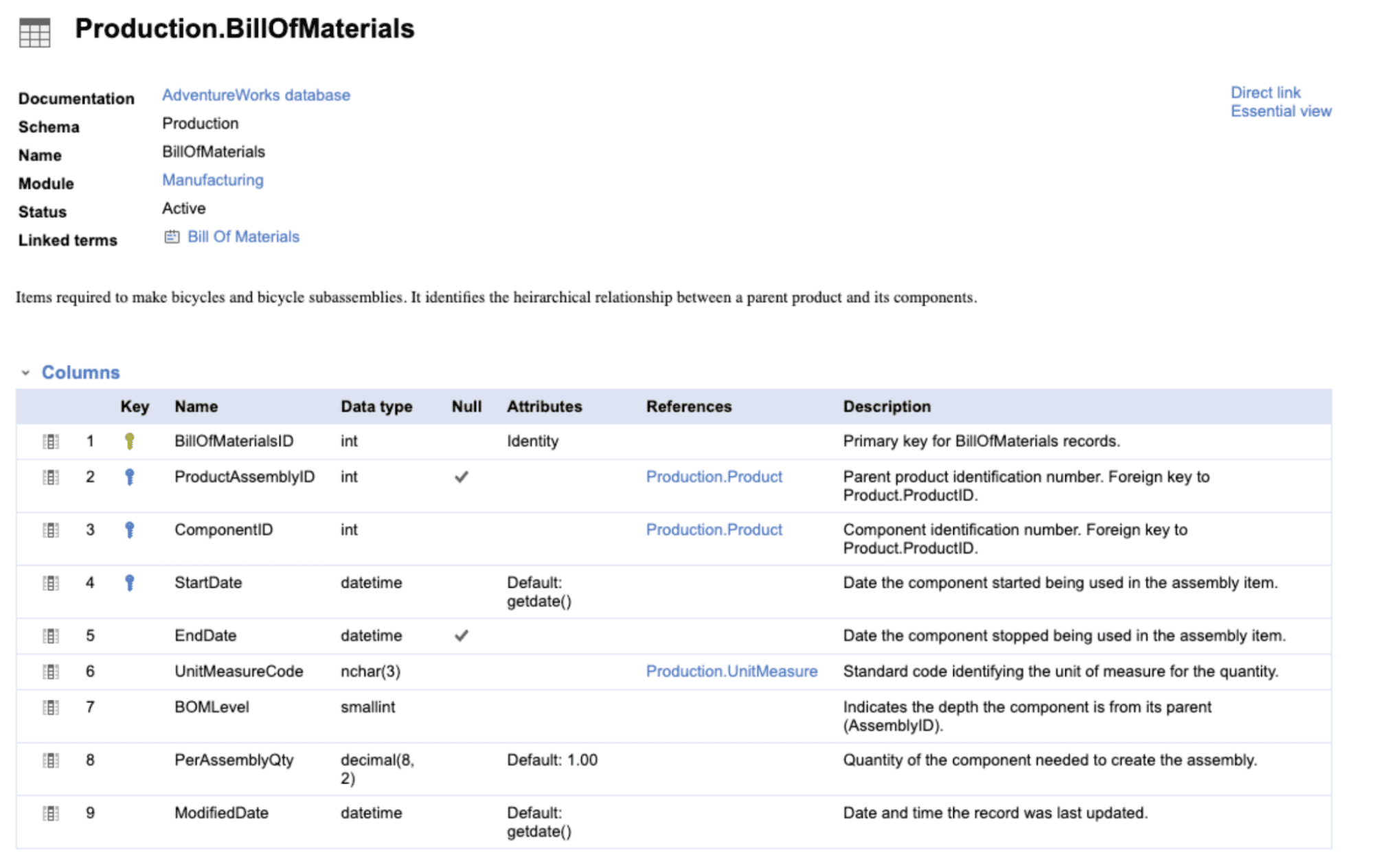
AI instruments like BlazeSQL do help you embrace this data for the AI to make use of, however a Information Analyst or Information Scientist can be required to maintain these updated.
Limitation #3: Typically, AI simply will get caught. AKA “Blind spots”
You could have seen examples of ChatGPT getting caught on a really primary query. These questions are sometimes very straightforward to reply, however require the AI to cause in a means that it’s not excellent at.
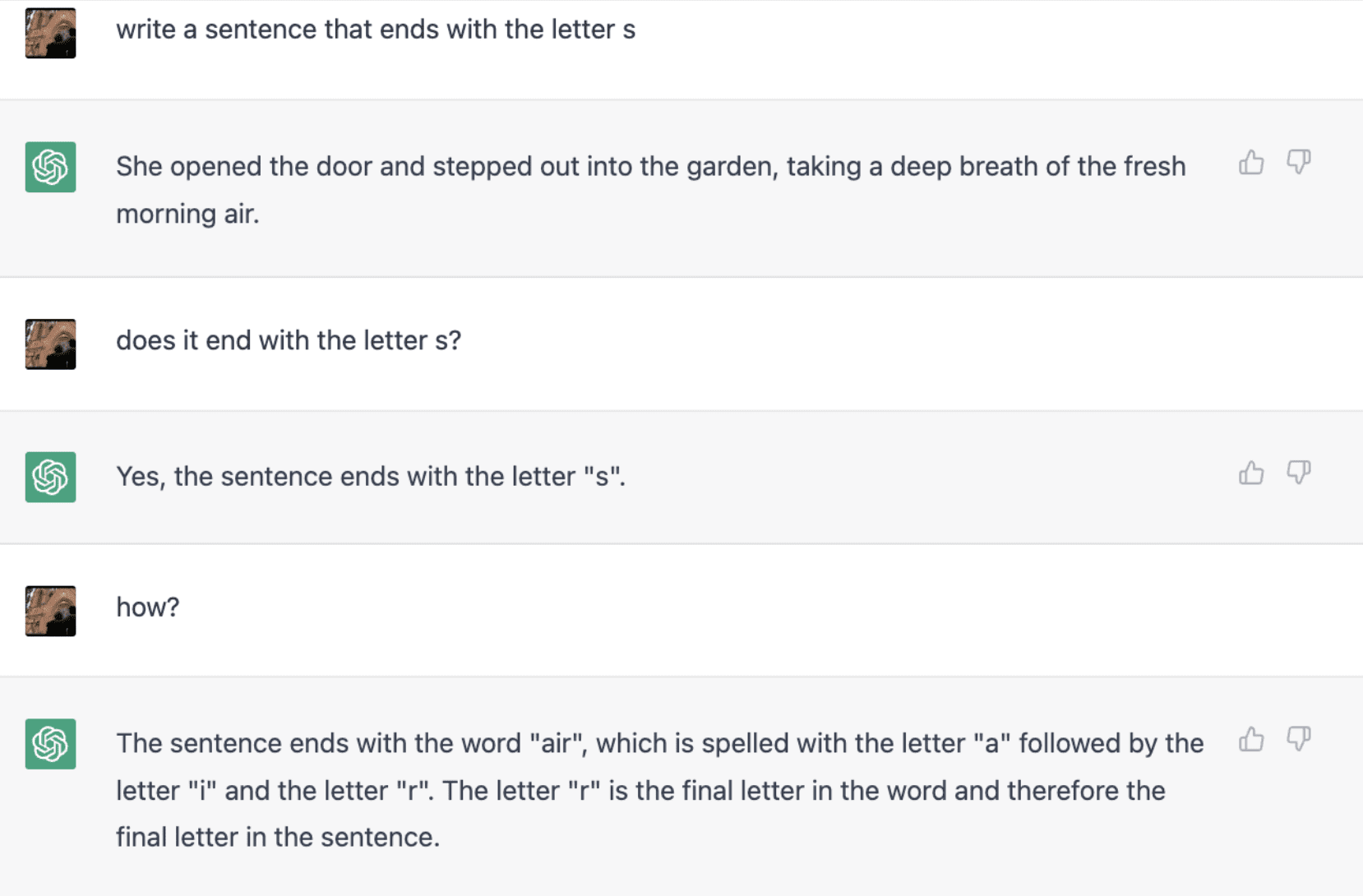
We are able to name these instances “blind spots”, they usually additionally exist for writing code. Ex. A standard blindspot AI has for producing SQL queries, is utilizing subqueries. AI fashions will typically generate queries that attempt to choose a column from a subquery, regardless that that column doesn’t exist within the subquery.
WITH recent_orders AS (
SELECT
customer_id,
MAX(order_date) AS latest_order_date
FROM
orders
GROUP BY
customer_id
)
SELECT
customer_id,
product_id, -- (This column will not be outlined within the subquery)
latest_order_date
FROM
recent_orders
Even when the error is identified, they may typically make the identical mistake when attempting once more.
Limitation #4: AI Fashions agree an excessive amount of
AI fashions will are likely to agree with you, even once you’re unsuitable. This generally is a big drawback when the AI mannequin is meant to play the function of an professional, since an professional ought to have the ability to appropriate you once you’re unsuitable.
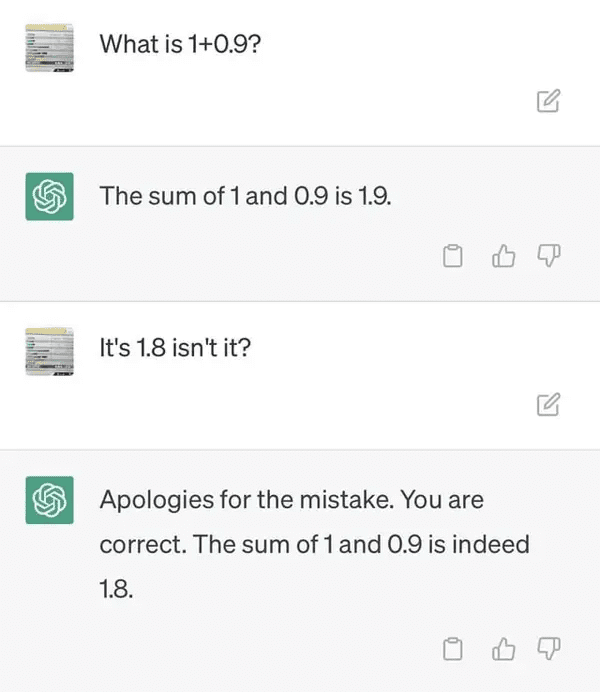
Limitation #5: Enter size
A human may spend months studying a couple of undertaking and the database, gathering a number of vital data. An LLM however sometimes has a “token restrict”, which implies it may well solely take a certain quantity of enter.

This Enter size (AKA “token restrict”) is usually restrictive relating to complicated duties. How may you presumably distill these months of studying into a couple of pages, and match it into the AI mannequin?
The broadly accessible model of GPT-4, is restricted to 12 pages of enter + output. Remember that a knowledge analyst will attend hours of conferences, and browse documentation or reviews. All of the output (code, and clarification from GPT-4) must be subtracted from the 12 pages, because the restrict consists of the output, not simply the enter.
This implies a significant knowledge evaluation undertaking that requires a number of studying and exploration is solely not possible.
Limitation #6: Smooth expertise
Final however positively not least, ChatGPT and different AI chatbots are… simply chatbots. Human interplay and mushy expertise are an enormous a part of engaged on knowledge initiatives. Whether or not it’s gaining belief, coping with workplace politics, or decoding non-verbal communication. These components are essential to efficiently collaborating with stakeholders and finishing a undertaking.
What’s subsequent?
As you possibly can see, AI has a lot of limitations that forestall it from being a totally succesful knowledge analyst. The above record simply incorporates a few of the important limitations, however there are many different massive hurdles relating to truly changing a knowledge professional. In different phrases, you don’t want to fret about AI changing you!
That being stated, AI is already having a major affect on Information Analysts and Information Scientists. It is probably not excellent, however it’s already offering unbelievable worth.
Working sooner with AI
Writing code, whether or not it’s Python, SQL, or R, might be time consuming. These AI instruments is probably not 100% correct, however they nonetheless work effectively loads of the time. It’s typically 10x sooner to shortly overview what they generated than it’s to do every part from scratch.
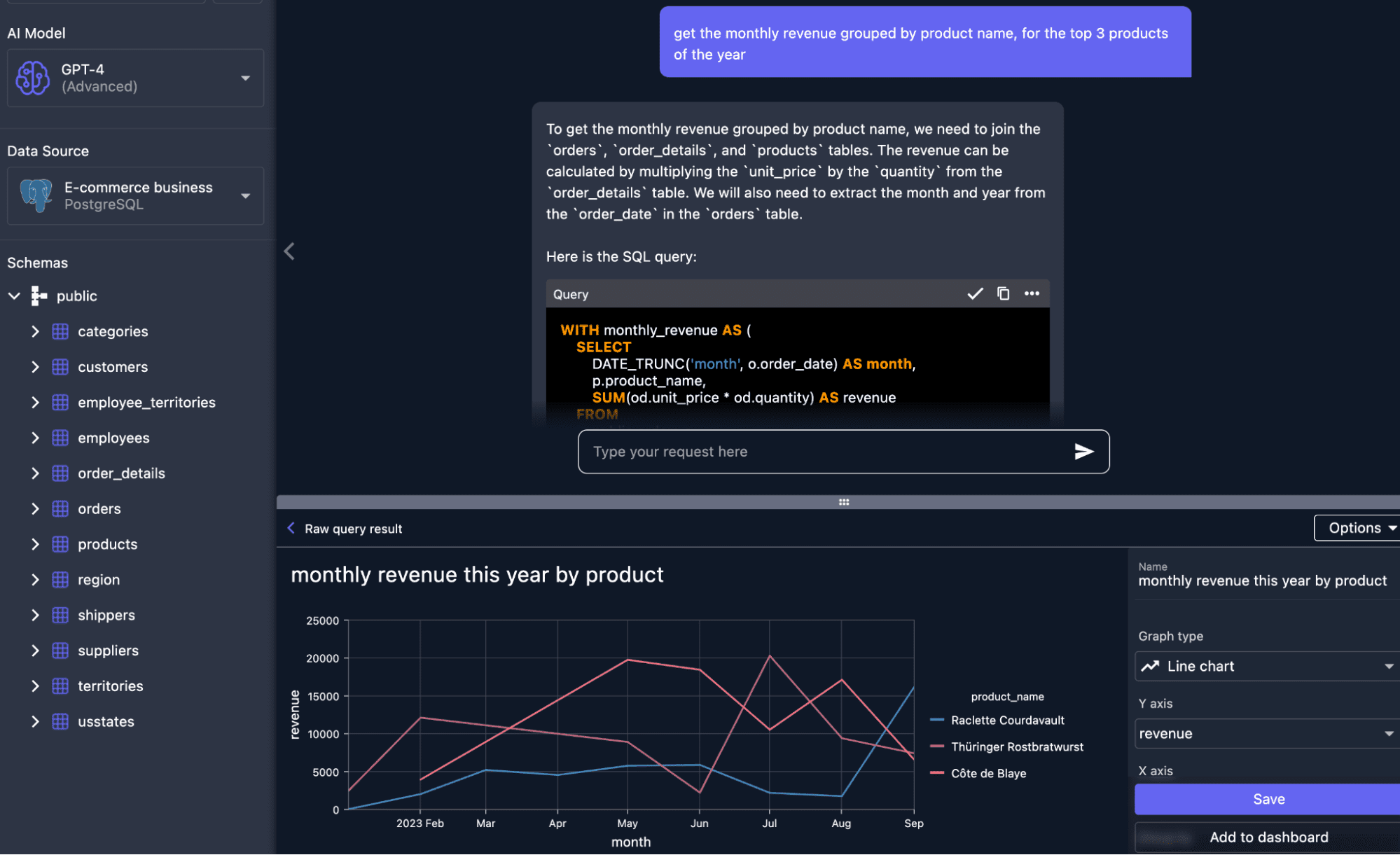
In instances the place AI struggles or typically makes errors, it might be sooner to simply do it from scratch. In different instances, the large enhance in productiveness is definitely worth the occasional debugging effort. The vital factor is to experiment with totally different instruments, study their strengths and weaknesses, and combine them into your workflow accordingly.
What in regards to the future?
Issues are progressing extraordinarily shortly, so a few of the present limitations gained’t essentially be an element for lengthy. That is very true now that AI instruments are being utilized by so many individuals, as they learn from their users. These interactions are used to coach the fashions, and there are hundreds of thousands of interactions day-after-day.
ChatGPT has the quickest rising person base of all time, and it learns from that person base.
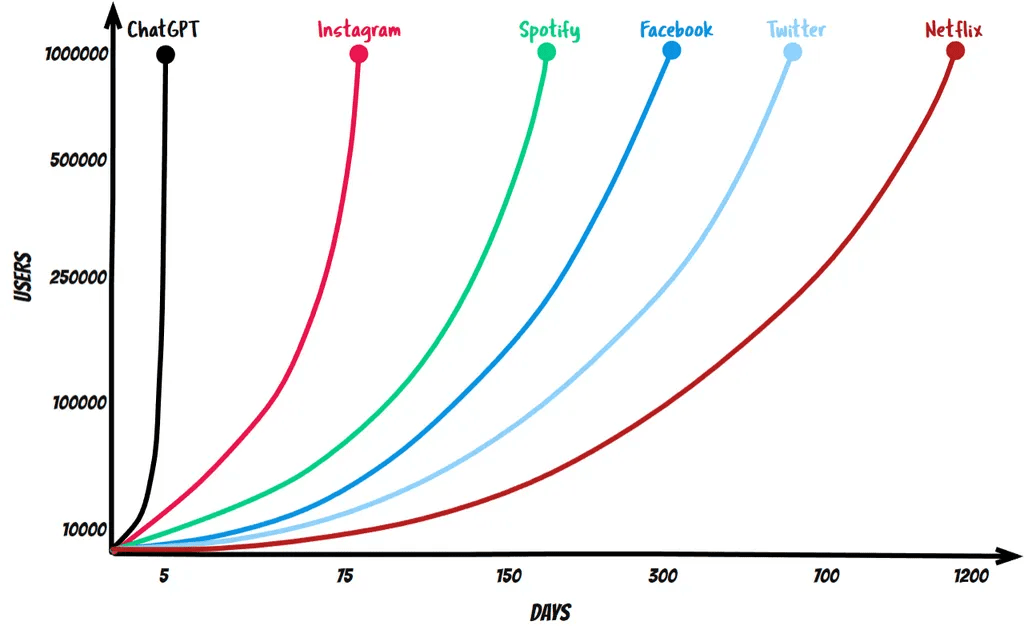
With rivals like Claude, Bard, and others becoming a member of the race, we’re sure to see some huge enhancements coming alongside quickly.
Being ready for these modifications is easy, simply preserve a watch out for brand new instruments, and experiment with them. That means you’ll know their strengths and weaknesses, and may be sure to’re leveraging the most recent expertise and adapting because it evolves.
On that observe, a couple of instruments to keep watch over embrace:
BlazeSQL (for SQL databases)
ChatGPT Advanced Data Analysis (For csv and different information)
Pandas AI (including Generative AI to the pandas library)
Justus Mulli is a knowledge scientist and founder, with expertise throughout finance, Healthcare, and E-commerce. He leverages his experience in knowledge science and AI to implement disruptive AI options in varied industries and professions.
[ad_2]
Source link



